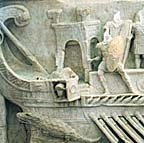 Last week I watched a Discovery Channel series called “Moments in Time” featuring the battle at Actium. I was quite surprised by the scientists’ estimated size of Antony’s war galleys. They said that each one was about the size of a football field and had up to 600 rowers. Apparently, they were able to estimate the size of the galleys from the relative size of the ships’ beaks that once adorned the Augustus' memorial near the site of his victory. Archaeologists have found the stones that were carved out to embed the beaks. The computer-generated recreation was quite vivid as well showing the use of fire bolts and huge round stones launched at the opposing ships. It very much resembled Vergil’s description in the Aeneid:
Last week I watched a Discovery Channel series called “Moments in Time” featuring the battle at Actium. I was quite surprised by the scientists’ estimated size of Antony’s war galleys. They said that each one was about the size of a football field and had up to 600 rowers. Apparently, they were able to estimate the size of the galleys from the relative size of the ships’ beaks that once adorned the Augustus' memorial near the site of his victory. Archaeologists have found the stones that were carved out to embed the beaks. The computer-generated recreation was quite vivid as well showing the use of fire bolts and huge round stones launched at the opposing ships. It very much resembled Vergil’s description in the Aeneid:
Across the center of the shield were shown
the ships of brass, the strife of Actium:
you might have seen all of Leucata's bay
teeming with war's array, waves glittering
with gold. On his high stern Augustus Caesar
is leading the Italians to battle,
together with the senate and the people,
the household gods and Great Gods; his bright brows
pour out a twin flame, and upon his head
his father's Julian star is glittering.
Elsewhere Agrippa towers on the stern;
with kindly winds and gods he leads his squadron;
around his temples, glowing bright, he wears
the naval crown, magnificent device,
with its ships' beaks. And facing them, just come
from conquering the peoples of the dawn,
from the red shores of the Erythraean Sea--
together with barbaric riches, varied
arms--is Antonius. He brings with him
Egypt and every power of the East
and farthest Bactria; and--shamefully--
behind him follows his Egyptian wife.
The squadrons close headlong; and all the waters
foam, torn by drawn-back oars and by the prows
with triple prongs. They seek the open seas;
you could believe the Cyclades, uprooted,
now swam upon the waters or steep mountains
had clashed with mountains as the crewmen thrust
in their great galleys at the towering sterns.
Torches of hemp and flying darts of steel
are flung by hand, and Neptune's fields are red
with strange bloodshed. Among all this the queen
calls to her squadrons with their native sistrum;
she has not yet looked back at the twin serpents
that swim behind her. Every kind of monster
god--and the barking god, Anubis, too--
stands ready to cast shafts against Minerva
and Venus and at Neptune. In the middle
of all the struggle, Mars, engraved in steel,
rages beside fierce Furies from the sky;
and Discord, joyous, strides in her rent robe;
Bellona follows with a bloodstained whip.
But Actian Apollo, overhead,
had seen these things; he stretched his bow; and all
of Egypt and of India, and all
the Arabs and Sabaeans, turned their backs
and fled before this terror. The queen herself
was seen to woo the winds, to spread her sails,
and now, yes now, let fall the slackened ropes.
The Lord of Fire had fashioned her within
the slaughter, driven on by wave and west wind,
pale with approaching death; but facing this,
he set the Nile, his giant body mourning,
opening wide his folds and all his robes,
inviting the defeated to his blue-gray
breast and his sheltering streams. But entering
the walls of Rome in triple triumph, Caesar [ Octavian Augustus]
was dedicating his immortal gift
to the Italian gods: three hundred shrines
throughout the city. And the streets reechoed
with gladness, games, applause; in all the temples
were bands of matrons, and in all were altars;
and there, before these altars, slaughtered steers
were scattered on the ground. Caesar himself
is seated at bright Phoebus' snow-white porch,
and he reviews the spoils of nations and
he fastens them upon the proud doorposts.
The conquered nations march in long procession,
as varied in their armor and their dress
as in their languages....
No comments:
Post a Comment